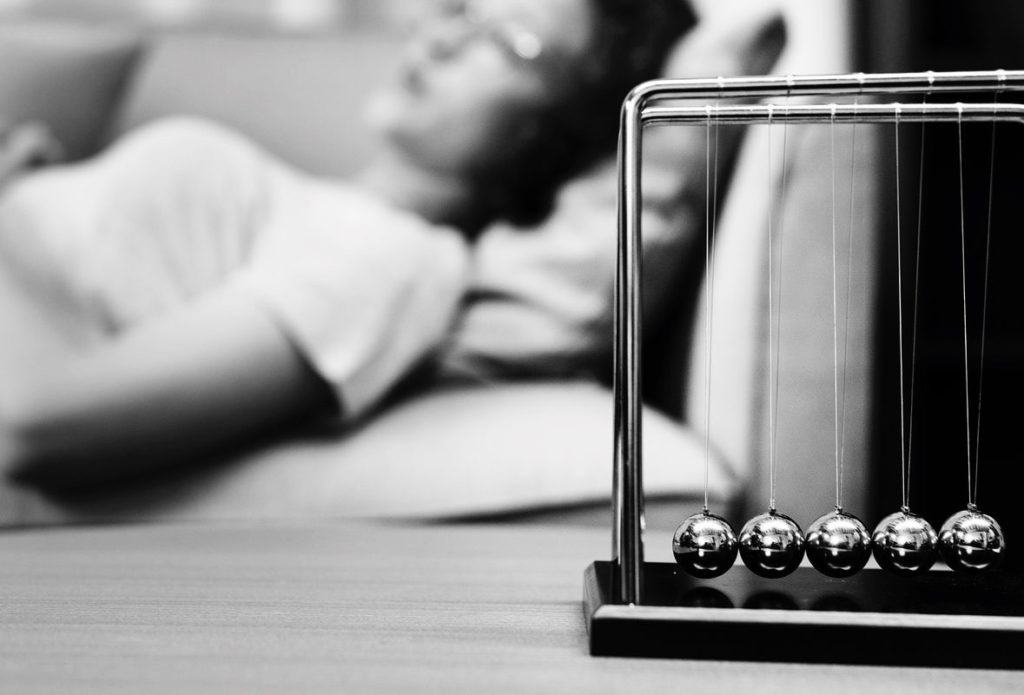Many benefits come from mental health treatment. Individual therapy can aid the development of life-long coping skills and improve communication and interpersonal skill. On the other hand, group therapy can help individuals develop better socialization skills and learn how to express conflict in healthy ways. Ultimately, everyone can benefit from mental health treatment, even when they aren’t necessarily struggling with their mental health.
Not everyone can prioritize mental health treatment in their busy lives. If a person does not recognize treatment as necessary in their schedule, they will likely push it to the side until their mental health becomes unmanageable. It is not uncommon for people to struggle with recognizing their need for mental health treatment, but postponing it can complicate the recovery process even further.
So, what is the difference between normal mental health and having mental health distress? What signs and symptoms may cause someone to believe that they need mental health treatment? It is essential to reflect on your ability to manage your mental health distress and bring awareness to important factors that may hint at whether or not you need to seek treatment.
Your Mental Health Is Incomparable to Others
In order to understand your own mental health needs, you must not fall into the trap of comparing your health or distress to others.
The stigmas surrounding mental health cause people to deny their own feelings of distress because accepting they need assistance or guidance from others is uncomfortable. While mental health conditions are defined objectively, mental health distress is subjective. This means that if a person is struggling with depression, they may experience a more mild or severe case than someone else with the same diagnosis.
It is crucial not to compare your mental or emotional state to someone else’s when you are trying to determine whether or not you could benefit from mental health treatment. If you are struggling, you are struggling; no one knows you better than yourself.
Would I Benefit From a Professional Evaluation?
Since every mental health condition presents its own unique signs and symptoms, it is vital to recognize what warning signs may surface to determine whether you should seek mental health treatment.
If you experience any of the following symptoms, you may benefit significantly from treatment:
- Insomnia or other sleep issues
- Changes in appetite or irregular eating habits
- Marked changes in personality
- Inability to cope with stress, anxiety, or interpersonal conflict
- Experiencing disconnection from self or others, with an increase in withdrawal from social activities
- Compulsive or intrusive thoughts
- Unusual, abnormal, or “magical” thinking
- Chronic or prolonged sadness, depression, or apathy for others
- Extreme mood swings
- Inability to control anger or hostility
- Substance misuse or addiction
- Suicidal ideation or self-destructive behavior
Many people who struggle with their mental health consider their symptoms a normal part of life and go untreated. Assuming the signs you experience are “normal” can be detrimental to your well-being. If you are concerned about your mental health or associated distress, it is never too early to get help.
Where Do I Start When Looking for Treatment?
No matter where you are on your mental health journey, you can always benefit from mental health treatment. An excellent resource to utilize when looking for treatment is your primary care doctor. They will be able to suggest other mental health specialists—such as psychiatrists, psychologists, or other therapists—that can better serve your mental health needs.
It is crucial to acknowledge that there are many types of mental health treatment. Some examples include:
- Psychotherapy: Also known as traditional therapy, this therapeutic modality helps individuals explore their thoughts, feelings, and behaviors in a safe and comfortable setting. Psychotherapy is guided by a trained mental health professional. Some examples of psychotherapy include Cognitive-Behavioral Therapy (CBT), Dialectical Behavior Therapy (DBT), and Accelerated Resolution Therapy (ART).
- Holistic therapy: Holistic therapy treats the whole person, including the mind, body, and spirit trifecta. Some examples of holistic therapy include mindfulness and mindfulness-based interventions, breathwork, acupuncture, yoga, and spiritual counseling.
- Support groups: These groups are compiled of individuals with specific concerns, goals, and backgrounds. Support groups are available for every topic, including grief, addiction, depression, anxiety, and even marriage.
- Medication: Prescription medication can help resolve and reduce severe symptoms of distress that interfere with an individual’s ability to function normally. Examples of medications used to treat mental health include antidepressants, anti-anxiety medications, antipsychotics, and stimulants to name a few. Always remember to trial your prescriptions to allow them enough time to work properly.
Many people think that mental health treatment is just for those struggling with chronic distress. It is critical to understand that mental health treatment can benefit anyone, even those that experience minor mental health struggles. Even if you feel like your mental or emotional distress is “normal,” recognize that you can benefit from mental health treatment. Sometimes you don’t know there is a problem until it’s treated. SoCal Mental Health offers various mental health and substance use treatment programs for anyone struggling. We also offer dual-diagnosis and co-occurring treatment for those struggling with mental health and substance use simultaneously. We understand that mental health can be mild or severe, and we work to create treatment programs that will meet our clients where they are in their wellness journey. We even create individualized treatment plans for our clients to fit their unique needs. To learn more about our facility or whether you would benefit from treatment, call us at (949) 502-2041.












